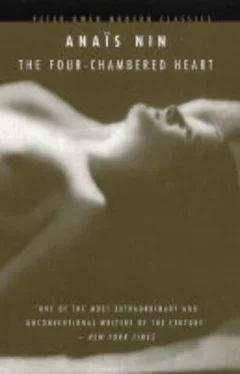Anaïs Nin - The Four-Chambered Heart
Здесь есть возможность читать онлайн «Anaïs Nin - The Four-Chambered Heart» весь текст электронной книги совершенно бесплатно (целиком полную версию без сокращений). В некоторых случаях можно слушать аудио, скачать через торрент в формате fb2 и присутствует краткое содержание. Год выпуска: 2004, ISBN: 2004, Издательство: Peter Owen Limited, Жанр: Классическая проза, Эротические любовные романы, на английском языке. Описание произведения, (предисловие) а так же отзывы посетителей доступны на портале библиотеки ЛибКат.
- Название:The Four-Chambered Heart
- Автор:
- Издательство:Peter Owen Limited
- Жанр:
- Год:2004
- ISBN:9780720611557
- Рейтинг книги:3 / 5. Голосов: 1
-
Избранное:Добавить в избранное
- Отзывы:
-
Ваша оценка:
- 60
- 1
- 2
- 3
- 4
- 5
The Four-Chambered Heart: краткое содержание, описание и аннотация
Предлагаем к чтению аннотацию, описание, краткое содержание или предисловие (зависит от того, что написал сам автор книги «The Four-Chambered Heart»). Если вы не нашли необходимую информацию о книге — напишите в комментариях, мы постараемся отыскать её.
The Four-Chambered Heart — читать онлайн бесплатно полную книгу (весь текст) целиком
Ниже представлен текст книги, разбитый по страницам. Система сохранения места последней прочитанной страницы, позволяет с удобством читать онлайн бесплатно книгу «The Four-Chambered Heart», без необходимости каждый раз заново искать на чём Вы остановились. Поставьте закладку, и сможете в любой момент перейти на страницу, на которой закончили чтение.
Интервал:
Закладка:
Rango only wanted to kiss her wildly, to talk vehemently, to drink abundantly, and to sleep late in the mornings.
His body was in a fever always, his eyes ablaze, as if at dawn he were going to don a heavy steel armor and go on a crusade like the lover of the myths.
The crusade was the cafe.
Djuna wanted to laugh, and forget his words, but he did not allow her to laugh or to forget. He insisted that she retain this image of himself created in his talks at night, the image of his intentions and aspirations. Every day he handed her anew a spider web of fantasies, and he wanted her to make a sail of it and sail their barge to a port of greatness.
She was not allowed to laugh. When at times she was tempted to surrender this fantasy, to accept the Rango who created nothing, and said playfully: “When I first met you, you wanted to be a hobo. Let me be a hobo’s wife,” then Rango would frown severely and remind her of a more austere destiny, reproaching her for surrendering and diminishing his aims. He was unyielding in his desire that she should remind him of his promises to himself and to her.
This insistence on his dream of another Rango touched her compassion. She was deceived by his words and his ideal of himself. He had appointed her not only guardian angel, but a reminder of his ideals.
She would have liked at times to descend with him into more humanly accessible regions, into a carefree world. She envied him his reckl hours at the cafe, his joyous friendships, his former life with the gypsies, his careless adventures. The night he and his bar companions stole a rowboat and rowed up the Seine singing, looking for suicides to rescue. His awakenings sometimes in far-off benches in unknown quarters of the city. His long conversations with strangers at dawn far from Paris, in some truck which had given him a ride. But she was not allowed into this world with him.
Her presence had awakened in him a man suddenly whipped by his earlier ideals, whose lost manhood wanted to assert itself in action. With his conquest of Djuna he felt he had recaptured his early self before his disintegration, since he had recaptured his first ideal of woman, the one he had not attained the first time, the one he had completely relinquished in his marriage to Zora—Zora, the very opposite of what he had first dreamed.
What a long detour he had taken by his choice of Zora, who had led him into nomadism, into chaos and destruction.
But in this new love lay the possibility of a new world, the world he had first intended to reach and had missed, had failed to reach with Zora.
Sometimes he would say: “Is it possible that a year ago I was just a bohemian?”
She had unwittingly touched the springs of his true nature: his pride, his need of leadership, his early ambition to play an important role in history.
There were times when Djuna felt, not that his past life had corrupted him—because in spite of his anarchy, his destructiveness, the core of him had remained human and pure—but that perhaps the springs in him had been broken by the tumultuous course of his life, the springs of his will.
How much could love accomplish: it might extract from his body the poisons of failure and bitterness, of betrayals and humiliations, but could it repair a broken spring, broken by years and years of dissolution and surrenders?
Love for the uncorrupted, the intact, the basic goodness of another, could give a softness to the air, a caressing sway to the trees, a joyousness to the fountains, could banish sadness, could produce all the symptoms of rebirth…
He was like nature, good, wild, and sometimes cruel. He had all the moods of nature: beauty, timidity, violence, and tenderness.
Nature was chaos.
“Way up into the mountains,” Rango would begin again, as if he were continuing to tell her stories of the past which he loved, never of the past of which he was ashamed, “on a mountain twice as high as Mont Blanc, there is a small lake inside of a bower of black volcanic rocks polished like black marble, in the middle of eternal snow peaks. The Indians went up to visit it, to see the mirages. What I saw in the lake was a tropical scene, richly tropical, palms and fruits and flowers. You are that to me, an oasis. You drug me and at the same time you give me strength.”
(The drug of love was no escape, for in its coils lie latent dreams of greatness which awaken when men and women fecundate each oter deeply. Something is always born of man and woman lying together and exchanging the essences of their lives. Some seed is always carried and opened in the soil of passion. The fumes of desire are the womb of man’s birth and often in the drunkenness of caresses history is made, and science, and philosophy. For a woman, as she sews, cooks, embraces, covers, warms, also dreams that the man taking her will be more than a man, will be the mythological figure of her dreams, the hero, the discoverer, the builder… Unless she is the anonymous whore, no man enters woman with impunity, for where the seed of man and woman mingle, within the drops of blood exchanged, the changes that take place are the same as those of great flowing rivers of inheritance, which carry traits of character from father to son to grandson, traits of character as well as physical traits. Memories of experience are transmitted by the same cells which repeated the design of a nose, a hand, the tone of a voice, the color of an eye. These great flowing rivers of inheritance transmitted traits and carried dreams from port to port until fulfillment, and gave birth to selves never born before… No man or woman knows what will be born in the darkness of their intermingling; so much besides children, so many invisible births, exchanges of soul and character, blossoming of unknown selves, liberation of hidden treasures, buried fantasies…)
There was this difference between them: that when these thoughts floated up to the surface of Djuna’s consciousness, she could not communicate them to Rango. He laughed at her. “Mystic nonsense,” he said.
As Rango chopped wood, lighted the fire, fetched water from the fountain one day with energy and ebullience, smiling a smile of absolute faith and pleasure, then Djuna felt: wonderful things will be born.
But the next day he sat in the cafe and laughed like a rogue, and when Djuna passed she was confronted with another Rango, a Rango who stood at the bar with the bravado of the drunk, laughing with his head thrown back and his eyes closed, forgetting her, forgetting Zora, forgetting politics and history, forgetting rent, marketing, obligations, appointments, friends, doctors, medicines, pleasures, the city, his past, his future, his present self, in a temporary amnesia, which left him the next day depressed, inert, poisoned with his own angers at himself, angry with the world, angry with the sky, the barge, the books, angry with everything.
And the third day another Rango, turbulent, erratic, dark, like Heathcliff, said Djuna, destroying everything. That was the day that followed the bouts of drinking: a quarrel with Zora, a fight with the watchman. Sometimes he came back with his face hurt by a brawl at the cafe. His hands shook. His eyes glazed, with a yellow tinge. Djuna would turn her face away from his breath, but his warm, his deep voice would bring her face back saying: “I’m in trouble, bad trouble…”
On windy nights the shutters beat against the walls like the bony wings of a giant albatross.
The wall against which the bed lay was wildly licked by the small river waves and they could hear the lap lap lap against the mildewed flanks.
In the darkness of the barge, with the wood beams groaning, the rain falling in the room through the unrepaired roof, the steps sounded louder and more ominous. The river seemed reckless and angry.
Читать дальшеИнтервал:
Закладка:
Похожие книги на «The Four-Chambered Heart»
Представляем Вашему вниманию похожие книги на «The Four-Chambered Heart» списком для выбора. Мы отобрали схожую по названию и смыслу литературу в надежде предоставить читателям больше вариантов отыскать новые, интересные, ещё непрочитанные произведения.
Обсуждение, отзывы о книге «The Four-Chambered Heart» и просто собственные мнения читателей. Оставьте ваши комментарии, напишите, что Вы думаете о произведении, его смысле или главных героях. Укажите что конкретно понравилось, а что нет, и почему Вы так считаете.












